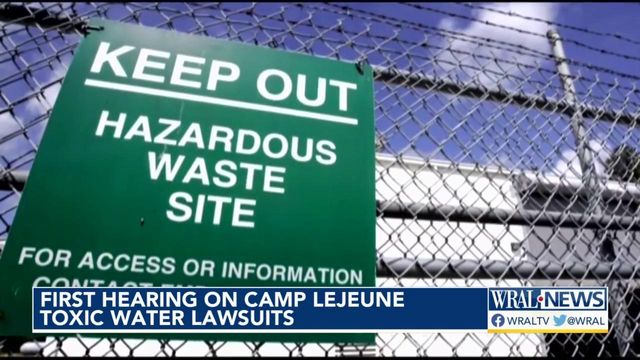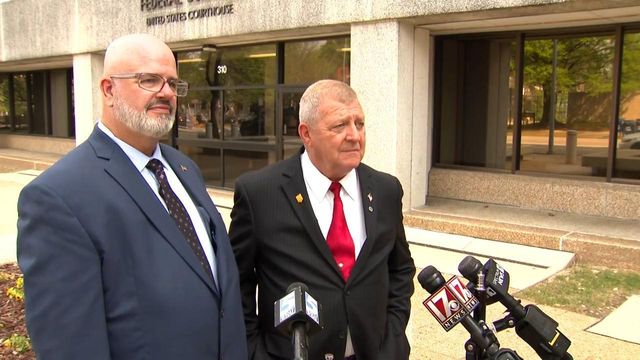Camp Lejeune toxic water claims get first day in court
Wednesday marked a milestone for families impacted by toxic water at Camp Lejeune from 1953 to 1987.
A federal judge in Raleigh held the first status hearing for what could be hundreds of thousands of claims against the U.S. government.
“It was almost unbelievable walking into that courtroom today,” said Master Sgt. Jerry Ensminger, who retired from the Marines.
Ensminger’s daughter, Janey, died of leukemia in 1985 at the age of 9.
“I started this journey in August of 1997, and even then, that was 14 years after Janey had been diagnosed and 13 years after she had died, and I hadn’t heard anything about the water contamination at Camp Lejeune,” Ensminger said.
Ensminger said he only found out because of a local TV news report about the Agency for Toxic Substances and Disease Registry releasing its public health assessment.
“I thought, ‘Oh, my God,’ what about the 87% of the people that joined the Marine Corps, that got out, and left and went back home, that was not going to be a news item back there, and those people were over there wondering what happened to them … themselves … either them or their family members,” Ensminger said. “So, I made it my mission to give them that information or at least get it to them.”
Michael Partain joined Ensminger outside the courtroom on Wednesday to share what the experience was like for him. Partain is now 55 years old, but was born on the base. He had breast cancer.
“Walking in here today, 16 years after I got involved in this issue, was a welcome beginning, a beginning of the end to paraphrase Winston Churchill,” Partain said. “We’re at the end of our struggle now.”
Tap to watch: Victims allege toxic water at Camp Lejeune, make case for restitution
The logistics of getting restitution for victims and their families will be tricky. All cases must be filed in the Eastern District of North Carolina, where there are four judges.
With the possibility of 1 million cases getting filed, U.S. District Court Judge James Dever did the math. Without a streamlined process, that could take more than 1,000 years.
“Our community has been waiting decades for a resolution in this, and today is the first step in that resolution,” Partain said of Wednesday’s hearing.
U.S. Congress passed the PACT Act in August 2022 confirming toxic water at Camp Lejeune from the 1950s to the 1980s. It opened the door for impacted families who suffered injuries from cancer to stillbirths to sue the government for relief.
The PACT Act also created 20,000 cases and the Department of the Navy hasn't even settled one yet.
“I don't understand what the hell they're doing,” Ensminger said of the Department of the Navy. “I don't think they do.
“I have a sneaking suspicion the Department of Navy is reluctant to make any kind of settlement offer because they don't want to admit guilt.”
Partain echoed Emsminger’s sentiments.
“It’s kind of like the fire department coming out and saying, ‘the house is on fire,’” Partain said of Dever asking how many cases had gotten settled.
In court, Dever expressed disappointment that no settlements have yet been reached, saying "The Navy needs to step up."
Dever urged attorneys and the government to work out a database to streamline the process. It includes figuring out:
- How long someone was at Camp Lejeune
- What the person was exposed to
- What condition the person had
- All possible or related causes of the person’s condition
He suggested that similar cases could be combined.
“You can build grids to resolve these things in an expeditious fashion,” said Mikal Watts, an attorney with Camp Lejeune Legal.
Dever explained the need to combine cases.
"We're trying to avoid a situation where this litigation goes as long as the Roman Empire," Dever said.
Raleigh-based attorney Elliot Abrams represents more than 20 clients. WRAL Investigates asked Abrams if creating a database was an impossible task.
"No, it's not an impossible task as long as folks follow what Judge Dever said today, which is we're going to come up with a process," Abrams said.
Ultimately, the hope is to combine similar cases and set up a settlement structure. It’s going to be a monumental process.
“With what the court said today, the roadmap is very clear as to what we ought to get done and quickly,” Watts said.
Dever made clear lawyers need to create a leadership framework and cooperate for the benefit of victims.
“I want the attorneys to cooperate with each other to work toward one common goal, and that’s justice for the victims,” Ensminger said.












